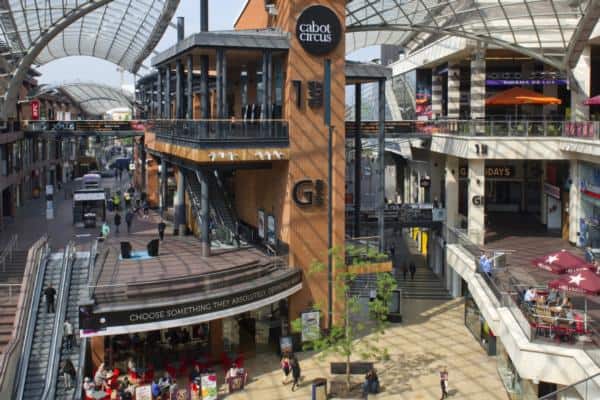Hammerson today reported a pre-tax loss of £1.7bn as shoppers stayed away from many of its city centre flagship shopping centres during the Covid-19 pandemic. It says it is now focusing its efforts on building communities and neighbourhoods for the future.
The group, which develops and operates retail property, has in recent years focused on its premium properties, often based in city centres, as it looked to adapt as shoppers made more of their retail purchases online. A year ago it was selling off its retail parks as it predicted the “best destinations” and “exceptional venues” would stay relevant to customers who wanted to buy both online and in stores. But the advent of Covid-19 confounded those expectations, at least short-term, bringing local shopping into favour with shoppers who were more likely to be working from home over the last year, while many have opted to buy online instead.
Now Hammerson says it will focus on shaping the neighbourhoods and communities where people will want to buy in the future as shoppers return to offices, even if they do so in a more flexible way. Longer-term, it expects to see greater urbanisation with 89% of Northern Europeans living in cities by 2050. It expects to see London’s GDP grow by 32% between 2020 and 2030, while that of Birmingham (+28%), Dublin (+24%) will also rise, along with the EU average (21%).
Hammerson today reported revenue of £182.9m in the year to December 31 2020, down from £246.2m a year earlier, and a pre-tax loss of £1.7bn, down from a loss of £779.3m the year earlier. It gained £11.6m on the sale of properties, but at the same time the book value of its properties fell by £493.5m and the valuation of its portfolio fell by 23.9% from £8.3bn in 2019 to £6.3bn in 2020 as it also sold properties – including its investment in VIA Outlets – for £759m.
The group says it collected 76% in 2020, while net rental income fell by 48.9% to £157.6m. It says that it provided an average rental waiver of 1.4 months during two main lockdowns in 2020, while rents were deferred for 0.3 months. At the same time leasing activity was 35% down.
Footfall was “severely impacted” both by Covid-19 and the fact that many of Hammerson’s flagship shopping centres are in city centres, such as Cabot Circus in Bristol (pictured) and the Bullring in Birmingham.
Hammerson chief executive Rita-Rose Gagné says: “As our results show, Hammerson was hit hard. The retail sector, already in the grip of major structural change, has been significantly impacted by the restrictions imposed to tackle the pandemic and we’ve also seen an increasing number of retail failures. Combined, this has resulted in the largest fall in net rental income and UK asset values in the group’s history.
“However, if this pandemic has highlighted anything, it is how much we all crave human contact as inherently social beings. As a business, Hammerson provides the places and social infrastructure where people want and need to be, and I am confident it will have a vital role in shaping neighbourhoods and communities in the future. Our immediate focus in 2021 is leading Hammerson through Covid-19 to safety.”
Hammerson suggests there is one more positive: over the last year the energy use of its shopping centres across Europe has fallen by 18% and its carbon emissions by 29%. Its sustainability team is now working closely with its design team on current plans for new developments and for liveable City Quarters, to ensure that the efficient use of resources, climate risk and health and wellbeing are all part of the design process from the outset.









